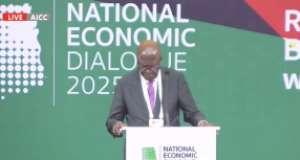
Ghana’s economic trajectory in 2025 reflects a mix of cautious optimism and ongoing challenges, with GDP growth projected at 5.4% and inflation expected to decline to 11.1%. The cedi has appreciated by 16% against the US dollar, signaling strengthened macroeconomic fundamentals.
While recent remarks by Dr. Mahamudu Bawumia attribute these gains to policies inherited from the previous administration, a deeper analysis reveals that Ghana’s economic recovery is not a passive result of past initiatives but rather a reflection of intentional fiscal discipline, investor-friendly reforms, and strategic interventions under President John Dramani Mahama.
Economic Trends and Key Indicators
Ghana’s economy is being shaped by several targeted economic measures:
1. Fiscal Management Over Inherited Policies – The previous administration introduced the Gold-for-Oil program, yet currency depreciation persisted, leading to a weakened cedi hovering around GHS17 to the dollar. Under Mahama, sound financial management, reduced borrowing, and debt restructuring have led to stronger investor confidence and improved forex flows, stabilizing the currency.
2. Industrial and Agricultural Expansion – Strategic initiatives in mining, manufacturing, and agriculture have boosted local productivity, mitigating reliance on volatile global markets. Key developments include emerging lithium production, which is driving industrial expansion, and revitalized poultry farming programs, ensuring sustained growth beyond commodity exports.
3. Digital Services and Innovation – Ghana’s services sector is thriving, with fintech, IT infrastructure, and mobile payments fueling expansion. The government’s streamlined regulatory framework has encouraged tech investment, reinforcing Ghana’s position as a leader in digital financial services in West Africa.
Agricultural Resilience and Food Security
Ghana’s agricultural sector remains a cornerstone of economic stability, with new initiatives aimed at reducing import reliance while boosting local food production:
Nkoko Nkitikiti, a poultry revitalization program, is enhancing domestic supply chains and reducing dependency on foreign imports. The Poultry Farm-to-Table initiative is promoting self-sufficiency, ensuring Ghanaian farmers maintain steady output to stabilize market prices. Modern mechanized farming and irrigation infrastructure are expanding agricultural output, reducing climate vulnerability.
Debunking the Narrative: Policy vs. Leadership
Dr. Bawumia’s assertion that NPP-era programs are responsible for the current stability overlooks the administrative shifts that have made a difference. Investor confidence, public financial management improvements, and better forex regulations are credited to Mahama’s disciplined governance approach, not passive continuity from past policies.
Export performance has improved, particularly in cocoa and gold sectors, under a revised trade policy favoring value addition and minimizing illicit flows. Debt sustainability efforts have garnered international recognition, reinforcing investor trust in Ghana’s macroeconomic framework. Bank of Ghana’s monetary interventions have kept inflation in check without stifling business growth.
Strategic Recommendations for Sustained Growth
As Ghana’s economy stabilizes, sustaining growth requires a balance of fiscal discipline, targeted investment, and structural reforms. Below are key policy recommendations for the Mahama administration:
1. Strengthen Fiscal Discipline and Debt Sustainability – Maintain stringent financial oversight, reduce unnecessary borrowing, and ensure long-term debt sustainability.
2. Deepen Industrialization and Local Value Addition – Expand manufacturing, encourage local lithium processing, and enhance technical education for industrial growth.
3. Enhance Agricultural Productivity and Food Security – Invest in mechanized farming, climate-resilient agricultural practices, and financial support for smallholder farmers.
4. Strengthen Financial and Currency Stability – Expand digital financial inclusion, reinforce forex reserves, and stabilize inflation through prudent monetary policies.
5. Invest in Infrastructure and Energy Reform – Address inefficiencies in the power sector, expand renewable energy initiatives, and improve transport networks.
6. Strengthen Trade and Regional Economic Integration – Leverage AfCFTA, enhance ECOWAS trade agreements, and develop export-processing zones.
7. Support Youth-Led Fish Farming Ventures – Introduce targeted financial support and technical training for young entrepreneurs in aquaculture, particularly catfish and tilapia farming. This initiative would boost local food security, create employment, and generate export revenue, empowering Ghanaian youth to participate in sustainable economic development.
8. Continue Strategic Governance and Transparency Efforts – Improve accountability measures, reinforce anti-corruption frameworks, and foster public engagement in policy-making.
Conclusion: Governance as the Defining Factor
Ghana’s 2025 economic resurgence is not merely a continuation of inherited policies but a result of strategic decision-making, fiscal discipline, and investor-driven reforms. While past programs contributed to foundational stability, today’s stronger currency, balanced inflation, and industrial growth reflect the impact of leadership-driven policy execution rather than legacy frameworks.
To ensure sustained economic progress, Ghana must prioritize the nationalization of all natural and mineral resources, local industrialization, financial stability, infrastructure development, youth-led entrepreneurship, and governance transparency, solidifying its position as a leader in economic sovereignty and resilience.
Retired Senior Citizen
Teshie-Nungua
[email protected]


